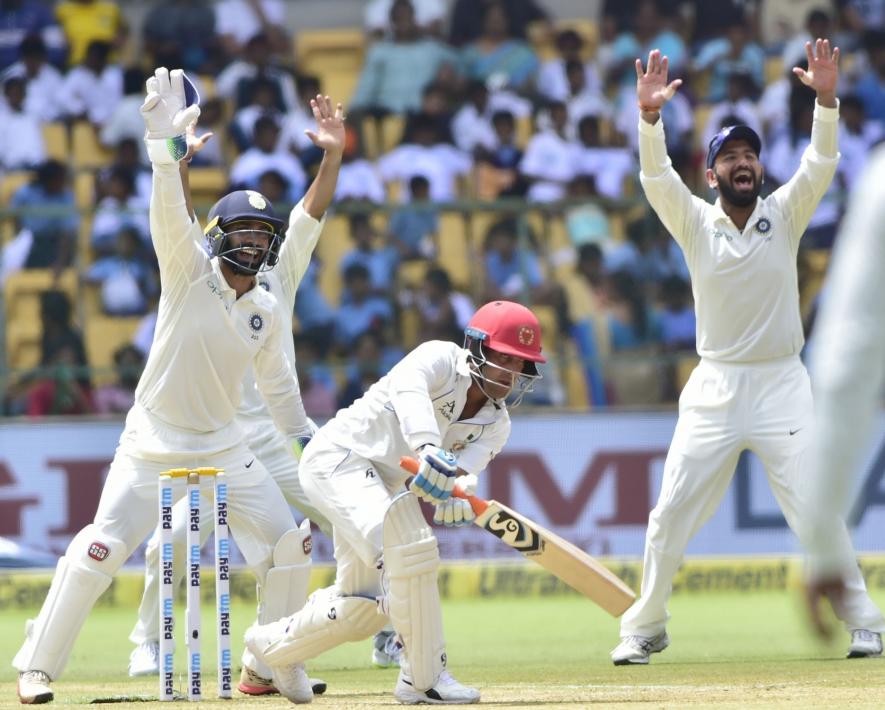How the Cricketing World Failed Afghanistan

In being bowled out for 109 and 103 in their maiden Test vs Indian cricket team, it is not Afghanistan who failed world cricket, but cricket failed in its duty of care to the team.
The cricket world failed Afghanistan on Friday.
The newest Test team’s big occasion lasted only two days. Their combined batting in two innings barely lasted two sessions. In 167 balls and 232 balls, 20 Afghan wickets tumbled, starkly underscoring the difference between white-ball cricket and the five-day game.
The easy thing to do is blame Afghanistan, but the truth is that they are far from the culprits in the one-sided two-day Test that ended in India’s swiftest victory in history.
In the lead-up to this inaugural Test, Afghanistan’s best players were involved in a Twenty20 series. If India, and the Board of Control for Cricket in India, were serious about helping Afghanistan, they would have offered the visiting team a few matches against domestic teams. There is no dearth of cricketers or stadia in India and the opportunity to host Afghanistan, the feel-good story of world cricket and the attendant good publicity that came with it, would have been snapped up by almost any state cricket association in the country.
READ MORE | India to Begin World Cup From June 5, Play Pakistan on June 16
Not long ago, Afghanistan were playing against countries where cricket was a recreational, part-time sport. Even given their climb up the ranks in Twenty20 and 50-over cricket, Afghanistan’s first Test match should not have been against the No. 1 ranked team. Afghanistan would have learnt more, given a better account of themselves and built up useful experience had they played Zimbabwe or Bangladesh before slowly working their way up the ladder.
While players from some other associate nations, including Ireland and Scotland, have the benefit of access to County cricket in England, Afghanistan’s players are not welcomed to first-class competitions by their more fortunate neighbours. India have the resources, thanks to a giant market for the sport and a growing economy, and there is no good reason why some of Afghanistan’s players should be allowed the chance to play in the Ranji Trophy, or similar tournaments.
While Afghanistan’s players may have been desperate to play Test cricket, to be granted that status and designation by the International Cricket Council, they needed a lot more than just being invited to turn up and play a Test match.
READ MORE | After Sandpaper Shame, Australia Attempts Bold Tempering
They needed, and deserved, the chance to show that there is more to their cricket than raw talent. But, to do so, they needed a few years of cricket that challenges them more than the T20 format before they played a Test match.
All is certainly not lost, for no team has begun its journey in Test cricket being the finished product. But few teams have been as ill-prepared for the rigours of the game. All the elements are in place for Afghanistan to develop into a force in Test cricket — and that is why the anticipation and expectation were so high in the lead-up to the Test — but it will not happen overnight. It will not happen merely by granting Test status and then leaving them to their own devices.
Just as Ceylon routinely and regularly played against the then state of Madras in the Gopalan Trophy, and India’s best turned out for teams in the domestic competition in Dhaka, ways and means have to be found to lift Afghanistan towards Test cricket.
There are enough exceptional minds in world cricket, with the imagination and expertise to come up with solutions that are beyond the scope of this column. The resources exist within the game, and the money-men who have taken cricket to where it is must find ways to funnel some of this towards reducing the gap between the very best and richest boards and others who need a hand.
READ MORE | FIFA World Cup 2018: Newsclick Gets to Moscow
There is little to be gained in mere lip service, calling for a more global approach from cricketing powers, including Twenty20 in the Olympics or expanding global tournaments merely for the sake of adding numbers. If cricket cannot look after its own, if it cannot strengthen the base it already has before it tries to expand, it may remain forever a game played merely by countries of the Commonwealth.
There is no good reason why that should be the case, but does the game have the collective will to do something about the status quo? If history is anything to go by, the more things change, the more they stay the same.
And so, in being bowled out for 109 and 103, it is not Afghanistan who failed world cricket. In setting them up in such a way that this was the best they could deliver, cricket failed in its duty of care to Afghanistan.
Get the latest reports & analysis with people's perspective on Protests, movements & deep analytical videos, discussions of the current affairs in your Telegram app. Subscribe to NewsClick's Telegram channel & get Real-Time updates on stories, as they get published on our website.
























